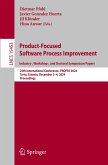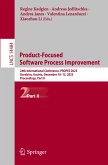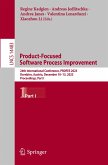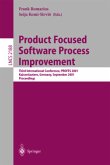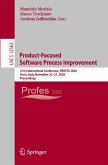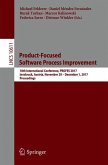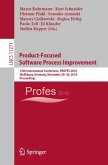Product-Focused Software Process Improvement
25th International Conference, PROFES 2024, Tartu, Estonia, December 2-4, 2024, Proceedings
Herausgegeben:Pfahl, Dietmar; Gonzalez Huerta, Javier; Klünder, Jil; Anwar, Hina
Product-Focused Software Process Improvement
25th International Conference, PROFES 2024, Tartu, Estonia, December 2-4, 2024, Proceedings
Herausgegeben:Pfahl, Dietmar; Gonzalez Huerta, Javier; Klünder, Jil; Anwar, Hina
- Broschiertes Buch
- Merkliste
- Auf die Merkliste
- Bewerten Bewerten
- Teilen
- Produkt teilen
- Produkterinnerung
- Produkterinnerung
This book constitutes the refereed proceedings of the 25th International Conference on Product-Focused Software Process Improvement, PROFES 2024, held in Tartu, Estonia, during December 2-4, 2024.
The 18 full papers, 12 short papers, 9 Industry papers, 2 Workshop papers, 2 Doctoral symposium papers, and one Keynote paper presented in this volume were carefully reviewed and selected from 85 submissions. The main theme of PROFES 2024 was professional software process improvement (SPI) motivated by product, process, and service quality needs. The technical program of PROFES 2024 was selected…mehr
Andere Kunden interessierten sich auch für
![Product-Focused Software Process Improvement. Industry-, Workshop-, and Doctoral Symposium Papers Product-Focused Software Process Improvement. Industry-, Workshop-, and Doctoral Symposium Papers]() Product-Focused Software Process Improvement. Industry-, Workshop-, and Doctoral Symposium Papers41,99 €
Product-Focused Software Process Improvement. Industry-, Workshop-, and Doctoral Symposium Papers41,99 €![Product-Focused Software Process Improvement Product-Focused Software Process Improvement]() Product-Focused Software Process Improvement39,99 €
Product-Focused Software Process Improvement39,99 €![Product-Focused Software Process Improvement Product-Focused Software Process Improvement]() Product-Focused Software Process Improvement70,99 €
Product-Focused Software Process Improvement70,99 €![Product Focused Software Process Improvement Product Focused Software Process Improvement]() Frank Bomarius / Seija Komi-Sirviö (eds.)Product Focused Software Process Improvement41,99 €
Frank Bomarius / Seija Komi-Sirviö (eds.)Product Focused Software Process Improvement41,99 €![Product-Focused Software Process Improvement Product-Focused Software Process Improvement]() Product-Focused Software Process Improvement39,99 €
Product-Focused Software Process Improvement39,99 €![Product-Focused Software Process Improvement Product-Focused Software Process Improvement]() Product-Focused Software Process Improvement39,99 €
Product-Focused Software Process Improvement39,99 €![Product-Focused Software Process Improvement Product-Focused Software Process Improvement]() Product-Focused Software Process Improvement39,99 €
Product-Focused Software Process Improvement39,99 €-
-
-
This book constitutes the refereed proceedings of the 25th International Conference on Product-Focused Software Process Improvement, PROFES 2024, held in Tartu, Estonia, during December 2-4, 2024.
The 18 full papers, 12 short papers, 9 Industry papers, 2 Workshop papers, 2 Doctoral symposium papers, and one Keynote paper presented in this volume were carefully reviewed and selected from 85 submissions.
The main theme of PROFES 2024 was professional software process improvement (SPI) motivated by product, process, and service quality needs. The technical program of PROFES 2024 was selected by a committee of leading experts in software process improvement, software process modeling, and empirical software engineering.
The 18 full papers, 12 short papers, 9 Industry papers, 2 Workshop papers, 2 Doctoral symposium papers, and one Keynote paper presented in this volume were carefully reviewed and selected from 85 submissions.
The main theme of PROFES 2024 was professional software process improvement (SPI) motivated by product, process, and service quality needs. The technical program of PROFES 2024 was selected by a committee of leading experts in software process improvement, software process modeling, and empirical software engineering.
Produktdetails
- Produktdetails
- Lecture Notes in Computer Science 15452
- Verlag: Springer / Springer Nature Switzerland / Springer, Berlin
- Artikelnr. des Verlages: 978-3-031-78385-2
- Seitenzahl: 432
- Erscheinungstermin: 2. Dezember 2024
- Englisch
- Abmessung: 235mm x 155mm x 24mm
- Gewicht: 651g
- ISBN-13: 9783031783852
- ISBN-10: 3031783859
- Artikelnr.: 71931233
- Herstellerkennzeichnung Die Herstellerinformationen sind derzeit nicht verfügbar.
- Lecture Notes in Computer Science 15452
- Verlag: Springer / Springer Nature Switzerland / Springer, Berlin
- Artikelnr. des Verlages: 978-3-031-78385-2
- Seitenzahl: 432
- Erscheinungstermin: 2. Dezember 2024
- Englisch
- Abmessung: 235mm x 155mm x 24mm
- Gewicht: 651g
- ISBN-13: 9783031783852
- ISBN-10: 3031783859
- Artikelnr.: 71931233
- Herstellerkennzeichnung Die Herstellerinformationen sind derzeit nicht verfügbar.
.- Keynote.
.- Environmental Sustainability of Machine Learning Systems: Reducing the Carbon Impact of their Lifecycle Process.
.- Full Research Papers.
.- An Approach to Cognitive Root Cause Analysis of Software Vulnerabilities.
.- Can Large Language Models (LLMs) compete with Human Requirement Reviewers? - Replication of an Inspection Experiment on Requirements Documents.
.- Defining Security Debt: A Case Study Based on Practice.
.- Enhancing Productivity with AI During the Development of an ISMS:Case Kempower.
.- Evaluating Software Quality Through User Reviews: The ISOftSentiment Tool.
.- Experience with Large Language Model Applications for Information Retrieval from Enterprise Proprietary Data.
.- From Reinvention to Reuse: An Empirical Example Study On Technical Debt Dataset.
.- Guidelines for Supporting Software Engineers in Developing Secure Web Applications.
.- Insights on the Use of Software Design Principles in Machine Learning Pipelines.
.- Interest in Working Remotely: Is Gender a Factor?.
.- On Job Demands and Resources in the Italian Software Industry.
.- Prototypical Leadership in Agile Software Development.
.- Regulatory Requirements Engineering in Large Enterprises: An Interview Study on the European Accessibility Act.
.- Supporting the Development of Oracle APEX Low-Code Applications With Large Language Models.
.- The Pains and Gains of Microservices Revisited.
.- Towards Enhancing Task Prioritization in Software Development Through Transformer-Based Issues Classification.
.- Towards Generating Measurable Artifact Models from Standards in Regulated Domains.
.- Use Cases for Artificial Intelligence in the Product Experimentation Lifecycle.
.- Short Research Papers.
.- Early Results of an AI Multiagent System for Requirements Elicitation and Analysis.
.- Empirical Evidence on Benefits of Agile Methods: How Much We Really Know?.
.- Enhancing Transparency in Space Metrics Use: Insights from an Initial Study.
.- Exploring an Inclusion Relation on Test Cases for Identification Unit and Integration Test Cases.
.- Practical considerations and solutions in NLP-based analysis of code review comments - An Experience Report.
.- ReqGenie: GPT-Powered Conversational-AI for Requirements Elicitation.
.- Software Engineering Practices in Smart Contract Development: A Systematic Mapping Study.
.- Supporting Value-aware Software Engineering through Traceability and Value Tactics.
.- The Effects of Semantic Information on LLM-based Program Repair.
.- Towards Automated Recovery of Links Between Code Commits and Requirements - Initial Results.
.- Towards Generating Compliance Action Plans: A Discussion of Needs and Opportunities.
.- Understanding Microservice Runtime Monitoring Data for Anomaly Detection with Structural Equation Modeling.
.- Environmental Sustainability of Machine Learning Systems: Reducing the Carbon Impact of their Lifecycle Process.
.- Full Research Papers.
.- An Approach to Cognitive Root Cause Analysis of Software Vulnerabilities.
.- Can Large Language Models (LLMs) compete with Human Requirement Reviewers? - Replication of an Inspection Experiment on Requirements Documents.
.- Defining Security Debt: A Case Study Based on Practice.
.- Enhancing Productivity with AI During the Development of an ISMS:Case Kempower.
.- Evaluating Software Quality Through User Reviews: The ISOftSentiment Tool.
.- Experience with Large Language Model Applications for Information Retrieval from Enterprise Proprietary Data.
.- From Reinvention to Reuse: An Empirical Example Study On Technical Debt Dataset.
.- Guidelines for Supporting Software Engineers in Developing Secure Web Applications.
.- Insights on the Use of Software Design Principles in Machine Learning Pipelines.
.- Interest in Working Remotely: Is Gender a Factor?.
.- On Job Demands and Resources in the Italian Software Industry.
.- Prototypical Leadership in Agile Software Development.
.- Regulatory Requirements Engineering in Large Enterprises: An Interview Study on the European Accessibility Act.
.- Supporting the Development of Oracle APEX Low-Code Applications With Large Language Models.
.- The Pains and Gains of Microservices Revisited.
.- Towards Enhancing Task Prioritization in Software Development Through Transformer-Based Issues Classification.
.- Towards Generating Measurable Artifact Models from Standards in Regulated Domains.
.- Use Cases for Artificial Intelligence in the Product Experimentation Lifecycle.
.- Short Research Papers.
.- Early Results of an AI Multiagent System for Requirements Elicitation and Analysis.
.- Empirical Evidence on Benefits of Agile Methods: How Much We Really Know?.
.- Enhancing Transparency in Space Metrics Use: Insights from an Initial Study.
.- Exploring an Inclusion Relation on Test Cases for Identification Unit and Integration Test Cases.
.- Practical considerations and solutions in NLP-based analysis of code review comments - An Experience Report.
.- ReqGenie: GPT-Powered Conversational-AI for Requirements Elicitation.
.- Software Engineering Practices in Smart Contract Development: A Systematic Mapping Study.
.- Supporting Value-aware Software Engineering through Traceability and Value Tactics.
.- The Effects of Semantic Information on LLM-based Program Repair.
.- Towards Automated Recovery of Links Between Code Commits and Requirements - Initial Results.
.- Towards Generating Compliance Action Plans: A Discussion of Needs and Opportunities.
.- Understanding Microservice Runtime Monitoring Data for Anomaly Detection with Structural Equation Modeling.
.- Keynote.
.- Environmental Sustainability of Machine Learning Systems: Reducing the Carbon Impact of their Lifecycle Process.
.- Full Research Papers.
.- An Approach to Cognitive Root Cause Analysis of Software Vulnerabilities.
.- Can Large Language Models (LLMs) compete with Human Requirement Reviewers? - Replication of an Inspection Experiment on Requirements Documents.
.- Defining Security Debt: A Case Study Based on Practice.
.- Enhancing Productivity with AI During the Development of an ISMS:Case Kempower.
.- Evaluating Software Quality Through User Reviews: The ISOftSentiment Tool.
.- Experience with Large Language Model Applications for Information Retrieval from Enterprise Proprietary Data.
.- From Reinvention to Reuse: An Empirical Example Study On Technical Debt Dataset.
.- Guidelines for Supporting Software Engineers in Developing Secure Web Applications.
.- Insights on the Use of Software Design Principles in Machine Learning Pipelines.
.- Interest in Working Remotely: Is Gender a Factor?.
.- On Job Demands and Resources in the Italian Software Industry.
.- Prototypical Leadership in Agile Software Development.
.- Regulatory Requirements Engineering in Large Enterprises: An Interview Study on the European Accessibility Act.
.- Supporting the Development of Oracle APEX Low-Code Applications With Large Language Models.
.- The Pains and Gains of Microservices Revisited.
.- Towards Enhancing Task Prioritization in Software Development Through Transformer-Based Issues Classification.
.- Towards Generating Measurable Artifact Models from Standards in Regulated Domains.
.- Use Cases for Artificial Intelligence in the Product Experimentation Lifecycle.
.- Short Research Papers.
.- Early Results of an AI Multiagent System for Requirements Elicitation and Analysis.
.- Empirical Evidence on Benefits of Agile Methods: How Much We Really Know?.
.- Enhancing Transparency in Space Metrics Use: Insights from an Initial Study.
.- Exploring an Inclusion Relation on Test Cases for Identification Unit and Integration Test Cases.
.- Practical considerations and solutions in NLP-based analysis of code review comments - An Experience Report.
.- ReqGenie: GPT-Powered Conversational-AI for Requirements Elicitation.
.- Software Engineering Practices in Smart Contract Development: A Systematic Mapping Study.
.- Supporting Value-aware Software Engineering through Traceability and Value Tactics.
.- The Effects of Semantic Information on LLM-based Program Repair.
.- Towards Automated Recovery of Links Between Code Commits and Requirements - Initial Results.
.- Towards Generating Compliance Action Plans: A Discussion of Needs and Opportunities.
.- Understanding Microservice Runtime Monitoring Data for Anomaly Detection with Structural Equation Modeling.
.- Environmental Sustainability of Machine Learning Systems: Reducing the Carbon Impact of their Lifecycle Process.
.- Full Research Papers.
.- An Approach to Cognitive Root Cause Analysis of Software Vulnerabilities.
.- Can Large Language Models (LLMs) compete with Human Requirement Reviewers? - Replication of an Inspection Experiment on Requirements Documents.
.- Defining Security Debt: A Case Study Based on Practice.
.- Enhancing Productivity with AI During the Development of an ISMS:Case Kempower.
.- Evaluating Software Quality Through User Reviews: The ISOftSentiment Tool.
.- Experience with Large Language Model Applications for Information Retrieval from Enterprise Proprietary Data.
.- From Reinvention to Reuse: An Empirical Example Study On Technical Debt Dataset.
.- Guidelines for Supporting Software Engineers in Developing Secure Web Applications.
.- Insights on the Use of Software Design Principles in Machine Learning Pipelines.
.- Interest in Working Remotely: Is Gender a Factor?.
.- On Job Demands and Resources in the Italian Software Industry.
.- Prototypical Leadership in Agile Software Development.
.- Regulatory Requirements Engineering in Large Enterprises: An Interview Study on the European Accessibility Act.
.- Supporting the Development of Oracle APEX Low-Code Applications With Large Language Models.
.- The Pains and Gains of Microservices Revisited.
.- Towards Enhancing Task Prioritization in Software Development Through Transformer-Based Issues Classification.
.- Towards Generating Measurable Artifact Models from Standards in Regulated Domains.
.- Use Cases for Artificial Intelligence in the Product Experimentation Lifecycle.
.- Short Research Papers.
.- Early Results of an AI Multiagent System for Requirements Elicitation and Analysis.
.- Empirical Evidence on Benefits of Agile Methods: How Much We Really Know?.
.- Enhancing Transparency in Space Metrics Use: Insights from an Initial Study.
.- Exploring an Inclusion Relation on Test Cases for Identification Unit and Integration Test Cases.
.- Practical considerations and solutions in NLP-based analysis of code review comments - An Experience Report.
.- ReqGenie: GPT-Powered Conversational-AI for Requirements Elicitation.
.- Software Engineering Practices in Smart Contract Development: A Systematic Mapping Study.
.- Supporting Value-aware Software Engineering through Traceability and Value Tactics.
.- The Effects of Semantic Information on LLM-based Program Repair.
.- Towards Automated Recovery of Links Between Code Commits and Requirements - Initial Results.
.- Towards Generating Compliance Action Plans: A Discussion of Needs and Opportunities.
.- Understanding Microservice Runtime Monitoring Data for Anomaly Detection with Structural Equation Modeling.


